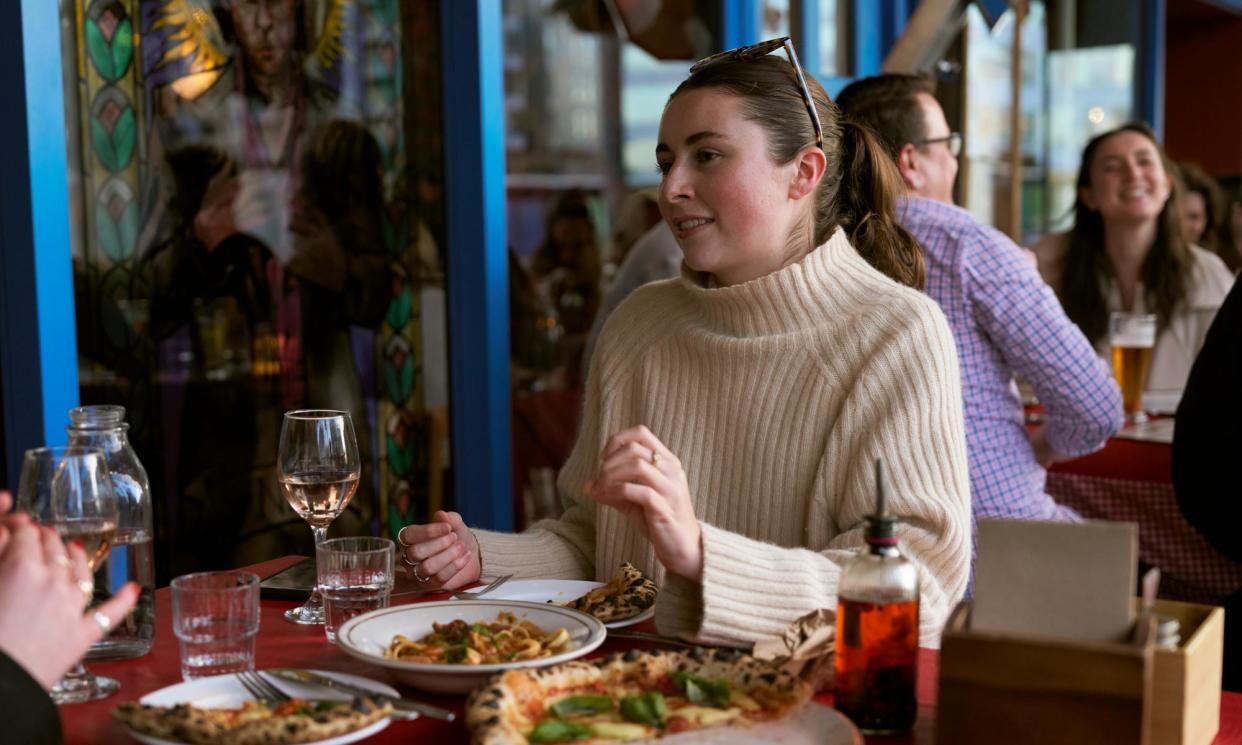Deserted by 8pm: Aucklanders revel in status as world’s earliest diners

It’s 5pm on Auckland’s Karangahape Road, and the tables spilling on to the street outside Coco’s Cantina are full – but these aren’t your usual sticky toddlers, or after-work suits. As the sun glints off the dusky-pink frames of her glasses, Gabriella Stead, 32, says she doesn’t care if it’s uncool to tuck into Italian food this early; she and Max Coombes, 34, are hungry.
“It’s meant to be kind of cringey and embarrassing to eat early because it means you care about digestion, but it’s all about having enough time before bed,” says Stead, who lives nearby and says she regularly dines at this hour. “When you’re out later, you just see people drinking.”
Two tables across, the law student Rosa Clarke and her friend Anna Russell, both 22, are sharing a margherita pizza, pasta pomodoro and arancini balls. “After this I’ll have the whole evening to go to the gym, shower, and do whatever I want,” Russell, an analyst, says. “This is just what I’ve been used to, growing up.”
In New Zealand’s largest city, no-shame early eating has become entwined in a dining culture where booking a table past 8.30pm at weekends is a rarity. According to a survey by international food magazine Chef’s Pencil, restaurants in Auckland take the earliest last orders in the world, alongside Luxembourg. Meanwhile in Rome, Mumbai and Buenos Aires, they’re still dining out at midnight at weekends. Australians tend to eat dinner early, too, with average last seating times around 9pm. In London the average is 9.45pm.
“If it’s not happening before 7.30 here, then it’s not going to happen,” says Coco’s front-of-house manager, Kira Mance Freire, of their dinner rush. At 5.30pm, their service is in full swing; they introduced a happy hour to draw in the creatives and students, young people who don’t drink as much and want to be home early, especially if they have sport the next day. Nearby, a table of Whitecliffe art school graduates are sharing sangria and cutting up collages while they wait for their meals. “What time do they eat in other places?” asks the uni student Kieran Panui, 19. Between 9 and 11pm on average, the Guardian informs him. “Really? I just find that bizarre.”
For restaurateurs, the culture of eating early presents an opportunity. Many have adapted, offering early dinner specials or using platforms such as First Table, a third-party booking system which draws in early diners with half-price meals. Its founder, Mat Weir, says the app has grown exponentially since he started it a decade ago, with 900 restaurants now on the books, almost 300 of those in Auckland. “Culturally in NZ we do dine earlier, but the majority of people would go out at that primetime spot of 7pm,” Weir says.
For others, hospitality has always meant being flexible. “As a businessman, I like the fact people want to eat earlier, and then when people come from overseas they want to eat later,” says Michael Dearth, who owns fine dining restaurant The Grove and Italian joint Baduzzi. “Someone comes in, they have a great time, they’re well watered, having a nice meal and a nice night, and then I get to sell the table again. In a post-pandemic world, I’m just hustling to make it work.”
At 6.15pm down the road at Apero, the restaurant is three-quarters full. The World fashion designer Benny Castles, here with his parents, says early dining is instilled in colonial Kiwi farming culture and the way cities are designed, especially Auckland with its urban sprawl and limited public transport. “You don’t become friends with a New Zealander until you’ve been invited into their household, so a lot of people eat at home. If you come out you’ll do it early, and then go home to suburbia. I mean, what’s in our culture, the six-o-clock swill? We didn’t exactly develop the aperitif.”
When he opened Apero in 2014, the restaurateur Ismo Koski, whose hospitality career has spanned Australia, the UK, and Canada, says he had the “romantic” notion of staying open late, but there was no market for it.
“You’d be standing around twiddling your thumbs. You might have people who walk in about 9.30 after a show and if the kitchen is still going we’ll do it, but rarely will we send food after 10pm.”
A few doors down at Java, friends Vivi Armelia, 24, and Sherleen Agustin are catching up for a 6.45pm dinner. The pair went to high school together in the Indonesian city of Pontianak, and Armelia says she was surprised when she moved to Auckland, aged 18, how early everything closed.
“In Indonesia the shops would be open so we’d still be hanging out, eating or shopping at 9 or 10pm. It feels very quiet here for me.”
By 7.30pm around the corner at Ponsonby Central, there’s no seats left at Argentinian restaurant El Sizzling Chorizo. A customer sneaks up to pay before his date can, and as he’s processing the man’s payment, the manager – and Argentinian – Tomas Villas, says the evening started getting busy from 5pm, and he will close the kitchen at 8.30pm. He’ll have his own dinner two and a half hours later, at 11pm, despite living in New Zealand for seven years. “I just can’t get used to it,” he says.
At 8.30pm, waiters at Baduzzi are taking dessert orders. It’s still buzzing, but beginning to empty out; the last booking was for 7.30pm. As he leans on a ledge after the rush, the duty manager, Jackson Blomfield, reckons it’s shifted earlier even compared with a couple of years ago, post-Covid, with people less likely to go out again once they’re home. He excuses himself to go and seat a surprise walk-in table. “That will be our last for the night, I’d say,” he says, checking the time. It’s 8.45pm. Almost bedtime.


